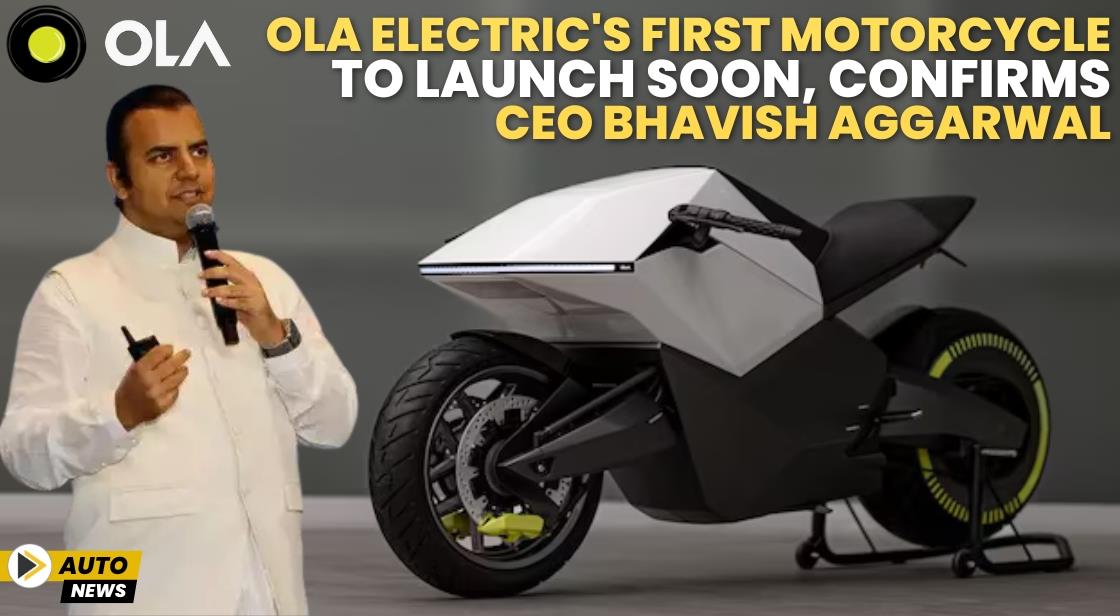Ola Electric's First Motorcycle to Launch Soon, Confirms CEO Bhavish Aggarwal

News Synopsis
Ola CEO Bhavish Aggarwal has confirmed that the much-anticipated launch of Ola Electric’s first motorcycle is imminent. Sharing updates through a recent tweet, Aggarwal posted images from his visit to Ola's Futurefactory, where the electric motorcycle will be manufactured, as well as the Gigafactory, which is on track to start commercial battery production soon. His post highlighted Ola's high-tech facilities and its all-women assembly line, signaling Ola’s commitment to innovative production and workforce diversity.
Ola Electric Motorcycle Launch Expected Soon, Confirms Bhavish Aggarwal
Inside Ola’s Advanced Production Facilities
Aggarwal's announcement provided a glimpse of Ola's latest developments in their state-of-the-art production facilities. The Futurefactory, reputedly the world’s largest two-wheeler manufacturing unit with a female-only workforce, is set to roll out the new electric motorcycle. Meanwhile, Ola's Gigafactory is preparing for battery production, marking a significant step in Ola's efforts to establish a vertically integrated supply chain for electric vehicles.
Focus on Futurefactory and Gigafactory Expansion
Ola's Futurefactory and Gigafactory aim to create a robust infrastructure for EV manufacturing in India. The Gigafactory’s battery production will help Ola decrease its dependence on external battery suppliers, enhancing the stability of its supply chain and reducing costs over time.
Customer Service Woes Amid Product Expansion Plans
However, Ola CEO Bhavish Aggarwal’s tweet comes amidst a wave of customer service criticisms, amplified by comedian Kunal Kamra, who has taken a public stance against Ola's after-sales support. Kamra has been vocal about delays in repair and inadequate customer service, using social media to share complaints from frustrated customers. He even posted a satirical deepfake video lampooning Aggarwal’s response to these issues, keeping the conversation on Ola’s customer service in the limelight.
Social Media Feud Draws Attention to Service Issues
The public exchange between Kamra and Aggarwal began in October, when Kamra criticized Ola’s handling of customer complaints. Aggarwal responded by accusing Kamra of defamation and challenged him to spend a day at an Ola service center. This back-and-forth has since gained traction online, with many users echoing Kamra’s concerns about Ola’s customer service.
Regulatory Scrutiny Over Ola’s After-Sales Service
The Central Consumer Protection Authority (CCPA) has issued a Show Cause Notice to Ola regarding its service practices. Ola asserts that it has resolved 99.1% of complaints filed through the CCPA, but the Department of Consumer Affairs is investigating these claims and may reach out to customers to verify the accuracy of Ola's resolutions.
The Importance of Addressing Customer Concerns
Ola’s commitment to expanding its EV lineup is clear, but the company faces a dual challenge: it must improve customer satisfaction alongside product innovation. Despite its technological advancements and workforce initiatives, Ola’s customer service issues could impact public perception and investor confidence.
What’s Next for Ola Electric’s Market Ambitions?
As Ola gears up to release its electric motorcycle and ramp up battery production, maintaining a positive reputation will be crucial for its long-term growth. The introduction of an electric motorcycle could help diversify its product range, but Ola must address existing after-sales challenges to reinforce customer loyalty and strengthen its position in the competitive EV market.
Conclusion:
As Ola Electric prepares to introduce its first electric motorcycle, the company stands at a pivotal moment that could define its trajectory in the highly competitive EV market. Ola’s announcement comes at a time when the company has faced significant challenges with after-sales service, an area increasingly in the public spotlight due to critiques from influential voices like comedian Kunal Kamra and numerous customer complaints.
Despite these hurdles, Ola’s ongoing investments in its Futurefactory and Gigafactory facilities underscore its commitment to pioneering electric mobility solutions in India. The Futurefactory, an all-women-operated manufacturing hub, not only symbolizes Ola’s ambitions in vehicle production but also highlights its emphasis on workforce diversity and progressive work culture.
While these manufacturing advancements mark substantial progress, Ola must now turn its focus towards strengthening its customer service framework to ensure long-term success. The company’s recent encounter with the Central Consumer Protection Authority (CCPA) serves as a reminder of the importance of post-purchase support, especially in the EV sector, where technical issues and service delays can impact brand reputation and customer loyalty.
Ola has stated that it has addressed 99.1% of complaints routed through the CCPA, but the Department of Consumer Affairs’ pending investigation could impact how consumers perceive these claims. A robust and efficient after-sales support system could not only prevent regulatory concerns but also enhance trust and satisfaction among Ola’s existing and future customers.
Looking ahead, Ola Electric faces a dual mandate: meeting high production targets to fulfill its ambitious EV lineup while establishing a more reliable customer support system. With its electric motorcycle launch, Ola has the opportunity to diversify its offerings and potentially capture a new market segment in the two-wheeler space.









